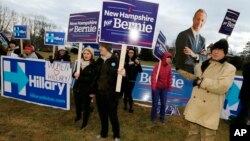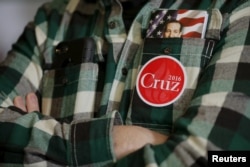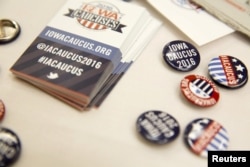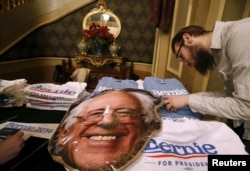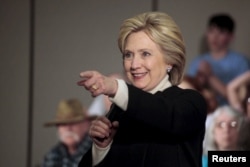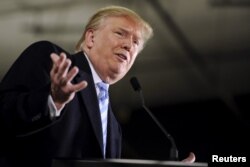One year from now, on January 20, 2017, the next president of the United States will take office. But between now and then, the country will embark on a long, complicated and unique democratic process to determine who that will be.
Right now, it's anyone's guess, since the field of candidates in both major parties is still very large.
Who's in the race?
In the race for the Democratic Party nomination, Vermont Senator Bernie Sanders, a self-declared "democratic socialist," is gaining ground on Hillary Clinton, the ex-secretary of state. But Sanders remains nearly 13 points behind Clinton, according to a RealClearPolitics average of recent nationwide polls. Former Maryland Governor Martin O'Malley is still in the race, although he has failed to gain any momentum.
The Republican contest is more uncertain, with a whopping 12 candidates still vying to become the party's nominee. In recent weeks a top tier has formed in the GOP race. It consists of billionaire real estate developer Donald Trump, Texas Senator Ted Cruz, and Florida Senator Marco Rubio. Trump and Cruz are competing for the support of disaffected voters in the party's ultra right wing, while Rubio is trying to appeal to a more centrist crowd.
After that, a second tier has emerged, consisting both of establishment and right-wing candidates that have struggled to gain any significant level of support.
Primary season
Though the campaign has dominated U.S. news headlines for over half a year, the actual election hasn't even begun yet. That will change in less than two weeks, when a series of state-by-state votes gets underway. Collectively, this process is referred to as the "primary election."
The goal of the primaries is for each major political party to choose a nominee to compete against each other in November's general election. This is done by assigning "delegates," or party representatives, to candidates based on the results of each state vote. To become the nominee, a candidate must secure a simple majority of his party's delegates.
Caucuses vs. primaries
There are two basic types of nominating events during primary election season: primaries and caucuses.
A primary is like a regular election, where citizens line up to cast ballots at a voting center. A caucus, however, is a unique part of the American electoral process, and requires additional explanation.
Basically, caucuses involve citizens gathering at a public space in their community, such as a church, to debate issues and share concerns. Afterwards, caucus-goers vote - either by writing the name of their preferred candidate on a blank slip of paper, or by physically moving to a side of the room based on their presidential preference.
Iowa caucus
The first caucus will be held in the rural, Midwestern state of Iowa on February 1.
Although Iowa does not have a good record for choosing the eventual nominee, the contest is seen as a crucial way for candidates to gain momentum early on in the primary process. Recent polls in Iowa show Clinton and Sanders virtually tied in the Democratic race. On the Republican side, Trump and Cruz are also locked in a tie, with Rubio polling a distant third.
New Hampshire primary
The first primary election is usually held in the northeastern state of New Hampshire. This year, the New Hampshire primary takes place on February 9.
Although New Hampshire is small and therefore does not assign many delegates, its first-in-the-nation primary is crucial, especially for candidates struggling to get support elsewhere. So far, Sanders has about a 7-point lead over Clinton in New Hampshire, according to RCP's poll average, while Donald Trump is has a 17.7 point lead in the state's Republican race.
States will continue to hold primaries and caucuses, assigning delegates to the winning candidates, until around mid-June.
Party conventions
Most of the time, a clear winner emerges, even before all the elections are over. But the result is not technically official until later in the summer, when each party holds its national political convention.
At a political convention, the delegates cast their vote in favor of a candidate. Usually this is just a technicality, since most delegates are already assigned to a particular candidate, based on primary and caucus results.
Contested convention?
But what happens if no candidate can secure a majority of his party's delegates and thereby win the nomination? That is what is referred to as "contested convention," and it’s very controversial and very rare.
If no majority is reached following the first official vote, delegates are then “released,” meaning they are allowed to switch their allegiance to a different candidate for the next round. This continues for as many rounds as necessary until a candidate secures the support of a majority of the delegates.
Many view a contested convention as undemocratic, since the outcome likely will not reflect the decision of citizens who actually voted in the primaries and caucuses. It also often opens the process to backroom deals between party leaders, an influence that for many feels corrupt.
The good news is, it usually doesn’t happen, if history is any indication. The last time a major national party convention opened without a clear winner was way back in 1967, when Gerald Ford had a lead but had not captured a majority of the delegates.
Could it happen this year?
However, several factors suggest there is somewhat more of chance this year's Republican convention will be contested. There are three main reasons why:
1) There is currently a large field of well-funded GOP candidates who have little incentive to drop out. This includes the billionaire Trump, who has the ability to self-fund his campaign if he chooses.
2) Any state holding a nominating event before March 15 is required to award its delegates proportionally, rather than on a winner-takes-all basis. This makes it less likely that any one candidate will jump out to an early lead.
3) A rule passed by the Republican Party in 2012 stipulates that any nominee must "demonstrate the support of a majority of the delegates from each of eight or more states." Most years, when there is a clear front-runner, that's not a problem. This year, with a lot of candidates, it could be.
Third party candidate?
Each presidential election cycle, a number of third party candidates also run for president. Most of the time, these are relatively unknown and underfunded candidates who do not make a significant impact on the race.
But this year, it could be different. Many GOP leaders are concerned Donald Trump, the current Republican frontrunner, could run as an independent candidate if he fails to win the GOP nomination. Trump has repeatedly hinted that he could launch a third-party run, even after making a high-profile pledge last year that he will support the party’s eventual nominee.
If Trump did run as an independent, many polls suggest he would draw substantial support from the Republican nominee in a general election. If that happens, it could open the door for an easy win for the Democratic candidate.




